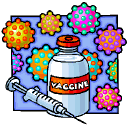What is Hepatitis B (HBV)?
 Hepatitis is a disease of the liver; it literally means an inflammation of the liver. Hepatitis B is caused by the HBV virus, (hepatitis B virus) although it can also be caused by alcohol and other toxins (poisonous substances). There are several types of hepatitis, but we are going to talk about the sexually transmitted Hepatitis B. It is transmitted from one person to another through blood and other bodily fluids (semen or vaginal secretions), just like other STDs. It is transmitted through sexual intercourse and from needles shared by intravenous drug users who have the virus. (This also includes contaminated needles used for steroids and tattooing.) You can be protected from the Hepatitis B virus by receiving a series of immunizations (injections or ‘shots’).
Hepatitis is a disease of the liver; it literally means an inflammation of the liver. Hepatitis B is caused by the HBV virus, (hepatitis B virus) although it can also be caused by alcohol and other toxins (poisonous substances). There are several types of hepatitis, but we are going to talk about the sexually transmitted Hepatitis B. It is transmitted from one person to another through blood and other bodily fluids (semen or vaginal secretions), just like other STDs. It is transmitted through sexual intercourse and from needles shared by intravenous drug users who have the virus. (This also includes contaminated needles used for steroids and tattooing.) You can be protected from the Hepatitis B virus by receiving a series of immunizations (injections or ‘shots’).
About 80% of all liver cancer is believed to be caused by the HBV virus. Hepatitis can cause your liver to stop functioning and may lead to cirrhosis (scarring of the liver) or liver cancer, both of which may cause severe illness and even death. Although there is no cure, there are medications available to help stop the spread of the disease. These medications are expensive and may not be available to families without health insurance.
Hepatitis B is 100 times more infectious than HIV.
Hepatitis B is the only STD that can be effectively prevented by a vaccine. The Centers for Disease Control (CDC) now recommends vaccination for all newborns in order to prevent infection of hepatitis B later on. The vaccine is highly effective and should be strongly considered. Check with your health care provider to find out if you should be vaccinated against it.
Symptoms
 A teenager with hepatitis B may feel tired, achy and have no appetite. They may be nauseated, have a mild fever, experience vomiting and abdominal pain. Hepatitis B can also cause jaundice, which is a yellowing of the skin and the whites of the eyes, and may cause the urine to appear tea-colored or very dark.
A teenager with hepatitis B may feel tired, achy and have no appetite. They may be nauseated, have a mild fever, experience vomiting and abdominal pain. Hepatitis B can also cause jaundice, which is a yellowing of the skin and the whites of the eyes, and may cause the urine to appear tea-colored or very dark.
After exposure to the hepatitis B virus you may not have any symptoms until 1 to 5 months later. Some people with hepatitis B don’t notice symptoms until they become very sick. Even when a person with hepatitis B doesn’t notice any symptoms, she or he can still transmit the disease to others. Some people continue to carry the virus in their bodies and are contagious for the rest of their lives.
If you have had a sexual partner who may have hepatitis B, you need to see your health care provider. He or she will do blood tests. If a diagnosis of hepatitis B is made, you will need to rest, but other than that, there is no real treatment for hepatitis B. Some people may need to be hospitalized for a little while if they are too sick to eat or drink. Almost all people with hepatitis B recover completely within 6 months.
Incubation Period
- Usually 45 – 180 days. Averaging around 60 – 90 days.
- You may test positive as early as 2 weeks after exposure.
For Information on Viral Hepatitis A, B, and C, check out the article or video…
For more, see STDs or visit:

